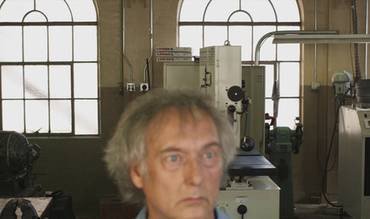Lu Chunsheng
dal 3/12/2010 al 8/12/2010
Segnalato da
3/12/2010
Lu Chunsheng
Stephenson Works, Newcastle
Chunsheng's films are not linked to specific places but rather to events. In The first man who bought a juicer bought it not for drinking juice, the two events that gave impetus for this, his most ambitious film to date, may seem disconnected, yet, were ever present in the artists mind during its production. Although Chunsheng's past works in film and photography appear preoccupied with the industrial era and communist history, his narratives are closer to surrealism than socialism.

Following its European premier and major exhibition at Iniva (Institute for International Visual Arts) London in early 2010, Fountain | Contemporary Art Projects in partnership with CIRCA is proud to present 'The first man who bought a juicer bought it not for drinking juice' at Stephenson Works Newcastle upon Tyne as part of Everybody Knows This Is Nowhere: A programme of international moving image. Part of a European-wide tour of the work curated and produced by Fountain | Contemporary Art Projects working with Serpentine Gallery and ShanghART Gallery, China.
Lu Chunsheng's films are not linked to specific places but rather to events. In The first man who bought a juicer bought it not for drinking juice, the two events that gave impetus for this, his most ambitious film to date, may seem disconnected, yet, were ever present in the artists mind during its production. Filmed entirely on-location in San Antonio, Texas, The first man who bought a juicer bought it not for drinking juice, began with Lu Chunsheng's interest in Orson Welles' 1938 adaption for radio of H.G. Wells, The War of the Worlds, a fictional account of an alien invasion which when broadcast was mistaken for a real news item, and with the story of the exile of Vladimir Ilyich Lenin in 1897 to eastern Siberia, a major agricultural region within Russia.
Although Lu Chunsheng's past works in film and photography appear preoccupied with the industrial era and communist history, his narratives are closer to surrealism than socialism. In the process of making his films and in this his most recently completed; The first man who bought a juicer bought it not for drinking juice, Lu Chunsheng has developed a formal filmic language using a form that alludes to mainstream cinematic narrative but often abandons it. In The first man who bought a juicer bought it not for drinking juice, our relationship to industrialisation, the natural and artificial, fact and fiction, and land agriculture dominated by mechanisation, is seemingly explored against a backdrop of American urban-industrial and rural settings that have held mythological status. Here centuries after the Industrial Revolution, which marked a major turning point in human history, two interdependent characters, one the creator and its creation, both toil towards a joint end goal, in an interdependent, interlocked existence.
Psychologically dense, the film documents in progressive stages, without any recognisable plot and without further explanation, the mechanistic progression of a combine harvester, a machine used for harvesting crops. One of only two characters in the film, the combine is cared for by a mechanic. Disassembled in a workshop, and exiled from the arena of its function, the various parts of its mechanism undergo careful repair and methodical reassembly based on detailed diagrammatic instructions.
As is often the case in Lu Chunsheng's work the male character portrayed in the film appears in a slight state of malaise, absurdly repeating acts which appear to have no clear outcome. Appearing at once removed from his world, in actuality the result of his deep absorption in it, the character's individual identity takes second stage to his individual act of productivity, the outcome of which promises continued sustenance. The documentation of this process, one including the skilled production of new machine parts and eventually to the machines subsequent 're-birth', a kind of Modern Prometheus, and its ultimate return to and looming presence in a cultivated field appears steeped in symbolism.
Through a series of contemplative tableaux, the film gradually unfolds into a seemingly epic evolutionary journey told in reverse, one shifted from the symbolism of the Cultural Revolution to the imagery of mass production, as played out in the exterior world and the interior life of the subject, one where the man machine relationship and philosophical questions of existence are re-examined.
As the artist himself has previously stated, the important thing is not the physical factors, but the incidents, and as the title of the film The first man who bought a juicer bought it not for drinking juice suggests, no event has a wholly predictable outcome.
Produced during a residency at Artpace (San Antonio, USA), organised by curator Hans Ulrich Obrist, this is the works second presentation following its European premiere and major exhibition at Iniva (Institute for International Visual Arts) London, April – May 2010, organised by Fountain | Contemporary Art Projects in partnership with David Thorp and Iniva. The film is commissioned and produced by Artpace San Antonio and supported by ShanghART Gallery, China.
Contact Keith Whittle
info@fountainprojects.co.uk
Image: Lu Chunsheng, The first man who bought a juicer bought it not for drinking juice (production still)
2008. Courtesy of and © the artist.
Stephenson Works
South Street, Newcastle upon Tyne NE1 3PE
4-9 December 2010 6-8 Daily
Entry Free



